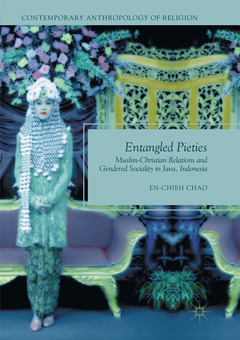Description
Entangled Pieties, Softcover reprint of the original 1st ed. 2017
Muslim-Christian Relations and Gendered Sociality in Java, Indonesia
Contemporary Anthropology of Religion Series
Author: Chao En-Chieh
Language: English
Subjects for Entangled Pieties:
Entangled Pieties
Publication date: 08-2018
Support: Print on demand
Publication date: 08-2018
Support: Print on demand
Entangled Pieties
Publication date: 08-2017
Support: Print on demand
Publication date: 08-2017
Support: Print on demand
Description
/li>Contents
/li>Biography
/li>Comment
/li>
This book explores the social life of Muslim women and Christian minorities amid Islamic and Christian movements in urban Java, Indonesia. Drawing on anthropological perspectives and 14 months of participant observation between 2009 and 2013 in the multi-religious Javanese city of Salatiga, this ethnography examines the interrelations between Islamic piety, Christian identity, and gendered sociability in a time of multiple religious revivals. The novel encounters between multiple forms of piety and customary sociality among ?moderate? Muslims, puritan Salafists, born-again Pentecostals, Protestants, and Catholics require citizens to renegotiate various social interactions. En-Chieh Chao argues that piety has become a complex phenomenon entangled with gendered sociality and religious others, rather than a preordained outcome stemming from a self-contained religious tradition.
1. Introduction: Pieties in Contact, Everyday Conflict and Pluralism in Muslim-Christian Indonesia.- 2. Generating Religioisities: The entangled history of Islam and Christianity in Java.- 3. Engineering Horizons: Controversies over Landscaping and Belonging in Salatiga.- 4. Regendering Community: Women Reshaping Javanese Rites of Passage in Mixed Communities.- 5. Regendering Ethnicity: Pentecostal Gender Dynamics Reshaping Chinese Imageries.- 6. Performing Pluralism: Islamic Greetings, Christian Halal Food, and Religious Holidays.- 7. Conclusion: Not Just a Story about Tolerance.
En-Chieh Chao is Assistant Professor of Sociology at National Sun Yat-sen University, Taiwan.
Among the first ethnographic accounts of Muslim-Christian relations from a gendered perspective Features first-hand stories of contact between conservative Muslims, “moderate” Muslims, Pentecostals, mainline Protestants, and Catholics Presents one of the first studies of everyday Muslim-Christian relationships in urban Java, focusing on the religiously mixed neighborhoods
© 2024 LAVOISIER S.A.S.
These books may interest you

Java, Indonesia and Islam 105.49 €



